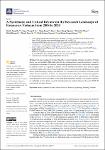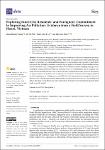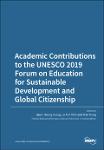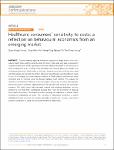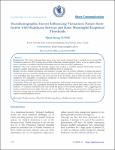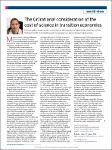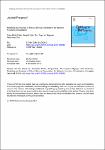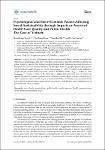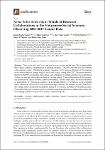Search
Author
- Manh-Toan Ho (3)
- Manh-Tung Ho (2)
- Minh-Hoang Nguyen (2)
- Thu-Trang Vuong (2)
- next >
Subject
- air pollution (1)
- Author- and journal-ba... (1)
- China (1)
- Citation boosting and ... (1)
- next >
Date issued
Search Results
This paper endeavors to understand the research landscape of finance research in Vietnam during the period 2008 to 2020 and predict the key defining future research directions. Using the comprehensive database of Vietnam’s international publications in social sciences and humanities, we extract a dataset of 314 papers on finance topics in Vietnam from 2008 to 2020. Then, we apply a systematic approach to analyze four important themes: Structural issues, Banking system, Firm issues, and Financial psychology and behavior. Overall, there have been three noticeable trends within finance research in Vietnam: (1) assessment of financial policies or financial regulation, (2) deciphering the correlates of firms’ financial performances, and (3) opportunities and challenges in adopting innova... |
Solutions for mitigating and reducing environmental pollution are important priorities for many developed and developing countries. This study was conducted to better understand the degree to which inner-city citizens and foreigners perceive air pollution and respond to it, particularly how much they willingly contribute to improving air quality in Vietnam, a lower-middle-income nation in Southeast Asia. During mid-December 2019, a stratified random sampling technique and a contingent valuation method (CVM) were employed to survey 199 inhabitants and 75 foreigners who reside and travel within the inner-city of Hanoi. The data comprises four major groups of information on: (1) perception of air pollution and its impacts, (2) preventive measures used to mitigate polluted air, (3) comm... |
Logically, and by most common standards, academics would be pleased to be cited, considering it a form of recognition of their intellect. In return, especially those with high citation counts, such as Clarivate Analytics’ Highly Cited Researchers, can benefit through peer recognition, rewards, funding, securing a better position, or expanding a collaborative network. Despite known and untold benefits, one issue has not been discussed: the right to refuse to be cited or the right to refuse a citation. Academics might not want to be cited by papers published in truly predatory journals, papers with false authors, or sting papers with falsified elements that employ underhanded ethical tactics. Currently, academics generally have the freedom to select where they publish their findings a... |
This book is a printed edition of the Special Issue Academic Contributions to the UNESCO 2019 Forum on Education for Sustainable Development and Global Citizenship that was published in Sustainability |
Background: This short communication report some new results obtained from a medical survey among 900 Vietnamese patients in 2015, looking into possibly influential sociodemographic factors as far as patient satisfaction is concerned, to establish empirical relationships between them for policy implications.
Methods: The study employed the baseline category logit models to establish empirical relationships between predictor variables and responses, which reflect different levels of satisfaction.
Results: Income, medical expenditure, and insurance coverage have the positive influence on improving patient satisfaction. However, insurance reimbursement rate has the negative influence. Patients with residency status are more demanding than those without. The more seriously ill, th... |

